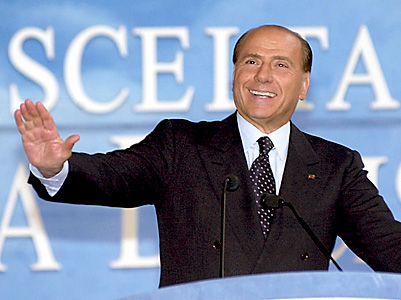Berlusconi, Silvio << `BEHR` loo SKOH nee, SIHL vee oh >> (1936-2023), a wealthy businessman, served as prime minister of Italy in 1994, from 2001 to 2006, and from 2008 to 2011. He supported tax cuts and privatizing state-owned services. Much of his political career was marked by legal troubles and charges of corruption.

Berlusconi was born in Milan on Sept. 29, 1936. He graduated from the University of Milan in 1961 with a law degree. Berlusconi began his business career by establishing a construction firm. The firm rapidly grew into a successful real estate development company. In 1975, Berlusconi founded Fininvest, a private holding company, to manage his various businesses. By 1980, he had developed a national network of television stations. He later acquired other television networks and created a company called Mediaset to manage his broadcast media holdings. In addition to Mediaset, Fininvest owned many other businesses, including publishing firms. From 1986 to 2017, the company owned AC Milan, one of Italy’s leading soccer teams. Berlusconi became one of the world’s wealthiest people. His extravagant and often controversial lifestyle made him one of the most talked-about figures in Italy.
In 1994, Berlusconi created a new conservative political party, Forza Italia, which supported candidates across Italy. Berlusconi announced his own candidacy for Italy’s Chamber of Deputies just two months before elections in March 1994. In the elections, an alliance of conservative parties led by Forza Italia defeated Italy’s liberal parties. Berlusconi became prime minister in May. However, the members of the conservative coalition found it difficult to work together. Berlusconi also faced legal charges of corruption as well as political accusations of conflict of interest. In December 1994, after one party withdrew from his coalition, Berlusconi was forced to resign as prime minister.
In elections in 1996, Berlusconi was reelected to Parliament, but the Olive Tree coalition of moderate and liberal parties defeated his conservative Freedom Alliance coalition. He then led the opposition in Parliament as head of the Freedom Alliance. For the elections in May 2001, Berlusconi forged a new coalition of moderate and conservative parties called the House of Freedoms. His coalition won a majority of seats in both chambers of Parliament. Berlusconi was again named prime minister. He adopted a program that included tax cuts and new public works projects.
In 2005, Berlusconi resigned as prime minister when some parties withdrew from his coalition government. But he formed a new coalition within a week and continued as prime minister. In 2006, he ran for reelection but lost to Romano Prodi in an extremely close election. Berlusconi won in Italy’s 2008 elections and once again became prime minister.
During his political career, Berlusconi faced numerous charges of tax fraud, corruption, and bribery. Prosecutors dropped many of the cases. Other cases resulted in convictions that were overturned on appeal. By late 2011, Berlusconi faced trial in three cases. Two involved tax fraud and abuse of power, and one concerned accusations that he paid for sex with an underage girl. Berlusconi denied the charges in all three cases. The prime minister claimed that all the trials were politically motivated. On Nov. 12, 2011, with Italy’s economy on the brink of collapse, Berlusconi resigned from office.
In 2012 and 2013, Berlusconi was convicted in all three criminal cases and sentenced to a number of years in jail. Berlusconi remained free pending appeals. In November 2013, the convictions led to Berlusconi’s expulsion from Parliament. In May 2014, he began serving a year of community service. In July, however, the convictions for abuse of power and paying for sex with a minor were overturned.
Berlusconi remained active in politics. In 2022, he w on election to the Italian Senate. He died on June 12, 2023.
See also Italy (Political changes).
